This grass fed and finished, pasture raised bison striploin roast is made with some of the most nutritious, local ingredients on the planet. Bison alone contains a much more beneficial and balanced nutritional profile (micros/macros) than most common commercial animals such as cow, chicken, and pig, all of which are often selectively bred. The bison striploin is seasoned with simple garden oregano, sea salt, pepper and a few pats of grass fed local ghee, then roasted to juicy perfection, served with refreshing and delicious spring mustard salad greens (lower in oxalates and more bioavailable than, say, spinach)!
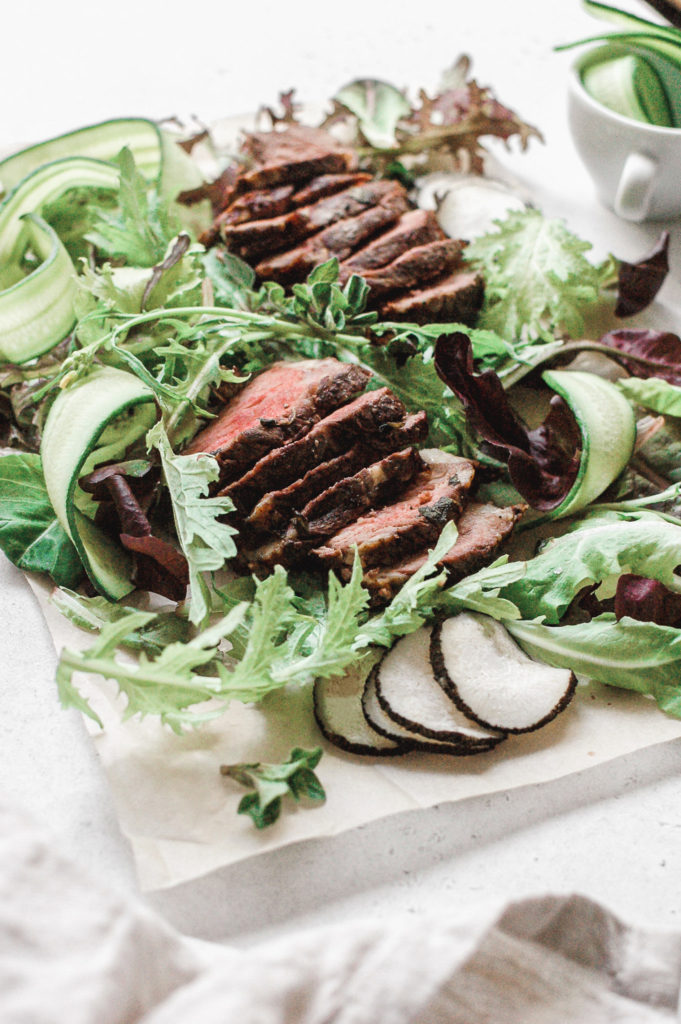
Grass fed pasture raised bison is one of the animal foods that made me feel most like myself after a lifetime of “conventional” foods, following a generally rigid “vegetarian/vegan” diet, including lots of manufactured food-like products, and even with an organic whole food plant based stint.
From increased mental balance and immunity to spiritual epiphanies, physical gains, and a sense of stability, fearlessness and groundedness in the flow of the world, it was one of the best and most tangible moves I’ve made when investing in my health, along with sunlight. Now I currently don’t feel drawn to consuming animal foods every single day (even if ethically, sustainably pasture raised and local – which is a regular must for many people’s situations, especially to manage autoimmune and mental health conditions), but even just a little can be transformative.
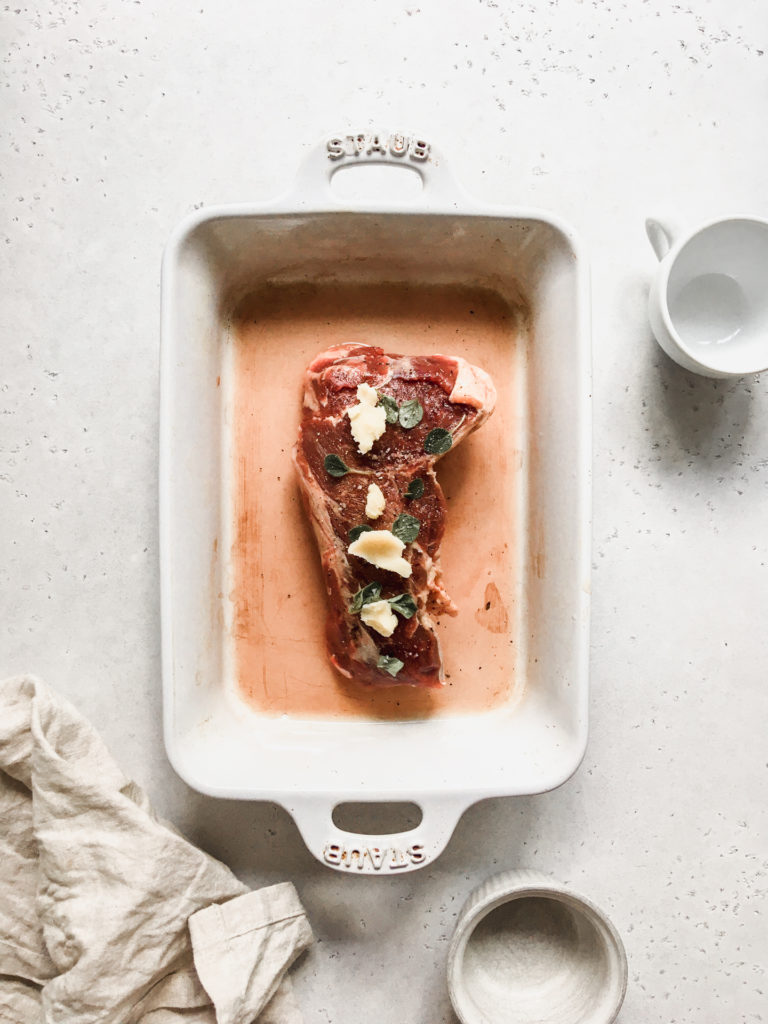
It is imperative to invest in and source animal foods wisely, as the energy with which they were raised will transfer to you. You won’t want to absorb the sad energy of a factory farmed commercial animal. Vote with your wallet and actions. Try to find a trusted farmer local to your region, or source wild game (probably the *most* ethical option). I currently source exclusively from Wild Meadows Farm Ontario, the owner Mike is meticulously transparent with Wild Meadows’ practices including what they feed and how they raise their animals – with the highest integrity and deepest reverence for the earth. You’ll want to look for grass fed and finished animal foods, as even the tiniest bit of non-GMO/organic grain can set off an inflammatory cascade in the body.
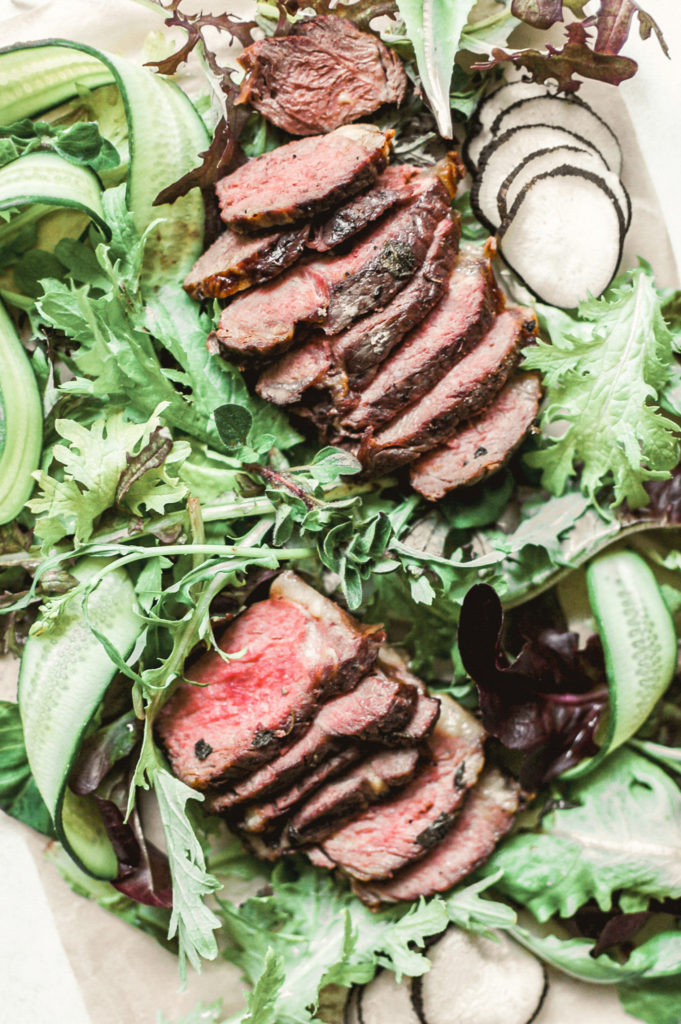
If you’re in the southern Ontario area, you can use the code ROOTTOSKY15 for $15 off your first order of a minimum of $150 at wildmeadowsfarm.ca. Trust me, it’s worth it, and investing in your health goes a LONG way, especially in this day and age where the food supply and environment is more toxic than ever – it is imperative to do everything you can to reverse toxicity if you want to live a richer, broader, more adventurous life.
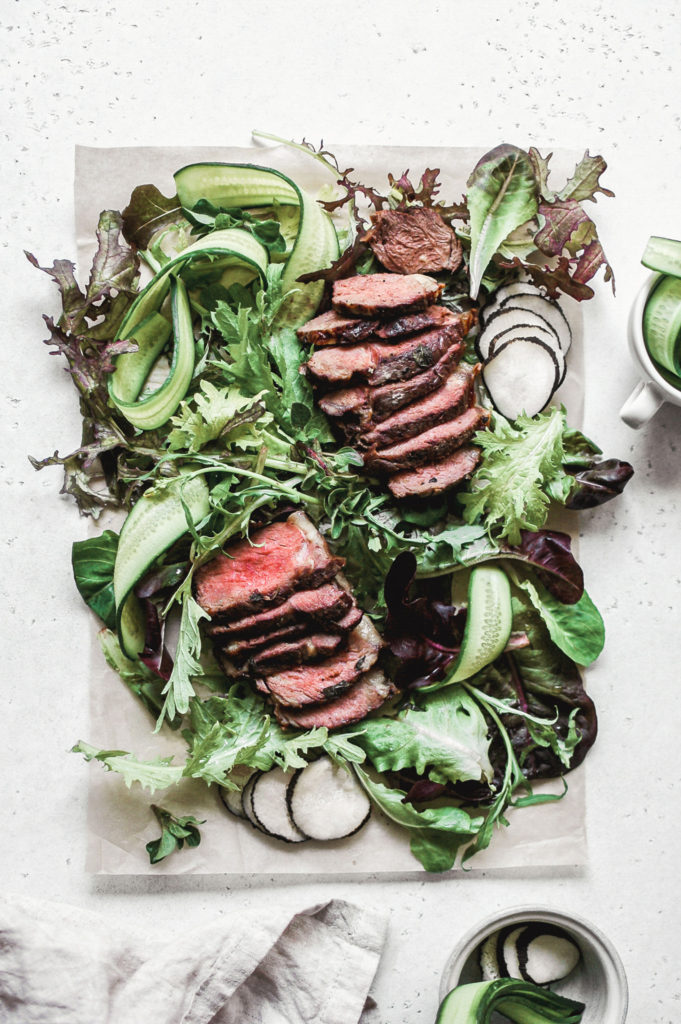
Your shopping list for this grass fed pasture raised bison striploin roast:
- 1 pack grass fed pasture raised bison striploin roast (approx. 1 lb) – do not trim any fat, this is the most beneficial, nutritious and tasty part!!
- Grass fed local ghee, or pasture raised bison/beef tallow if you don’t do dairy (a few pats, about 1 tbsp)
- Handful of fresh garden oregano (about 4 tsp)
- Sea salt and pepper, to taste (I prefer Celtic, Redmond, Mayan, Peruvian or Icelandic sea salts, they’re the least contaminated)
- Seasonal spring mustard greens mix – or any organic local greens you prefer
- Black radish
- Mini cucumbers
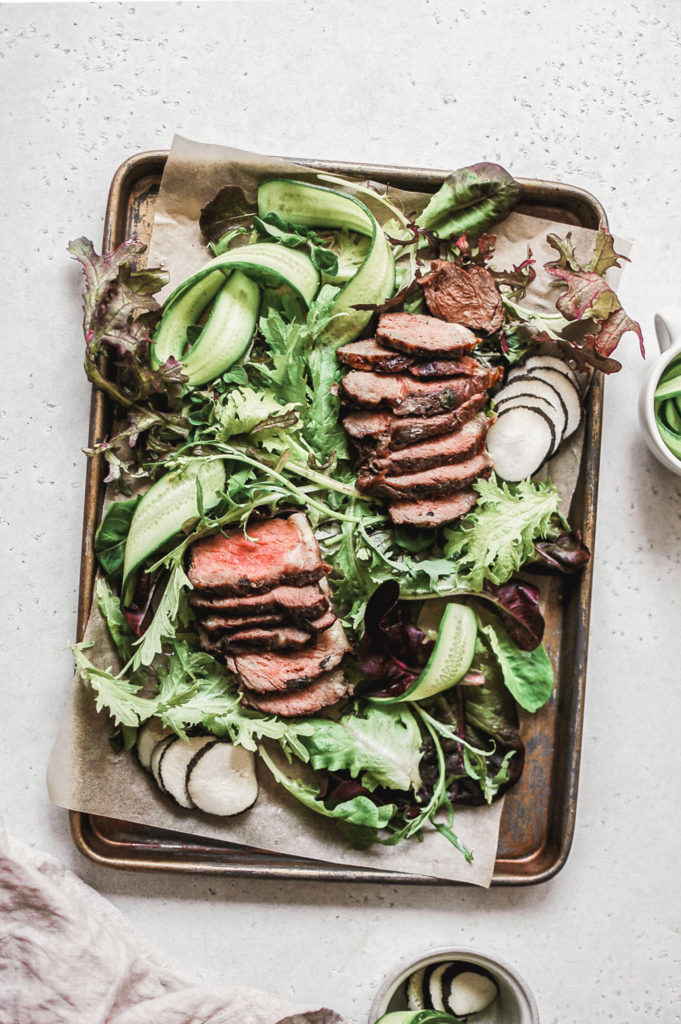
Enjoy this roast? Try this similar roasted grass fed and finished bison sirloin steak.
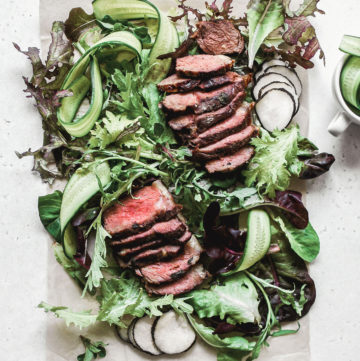
Grass Fed Pasture Raised Bison Striploin Roast
Equipment
- Roasting tray with unbleached biodegradable parchment paper if needed, to avoid food's direct contact with aluminum/mixed metals
- Instant-read thermometer (optional)
- Serrated steak knife
- Large salad bowl
- Platter, for serving
Ingredients
Bison Striploin Steak
- 1 lb grass fed and finished, pasture raised bison striploin steak keep the fat on!!
- 4 tsp fresh organic oregano
- 1 tbsp grass fed local ghee, or grass fed/finished, pasture raised bison/beef tallow if you don't do dairy
- sea salt and organic black pepper, to taste
Spring Salad
- 2 cups organic, local mustard greens or other seasonal salad greens
- 2 medium organic black radishes, thinly sliced
- 2-3 mini organic cucumbers, thinly sliced into ribbons
- juice of 1/2 organic lemon
- 1 tbsp organic/biodynamic olive oil
- sea salt and organic black pepper, to taste
Instructions
Bison striploin steak
- Thaw the steak overnight in its package in the refrigerator. Prepare a roasting tray, lined with unbleached biodegradable parchment paper, if necessary. On the tray, place the meat fat side up if applicable. Season both sides of the steak evenly with the sea salt and pepper. Sprinkle the fresh oregano over the top surface, and evenly spread out the pats of ghee on the surface. Marinate at room temperature for at least 30 minutes, or overnight.
- When ready to roast, preheat the oven to 400°F. Roast the meat, fat side up, about 20-30 minutes or until an internal temperature of 135-140 degrees (medium-rare) is reached for maximum flavor and tenderness, or 140-150 degrees (medium). An instant-read thermometer can come in handy so you can remove the roast intermittently and check it (I usually don't bother).
- Meanwhile, prepare the salad. In a large bowl, toss the spring mustard greens, radish, and cucumbers with the lemon juice, olive oil, salt and pepper. Set aside.
- When the roast is ready, remove it from the oven. Let it rest at least 15- 20 minutes to allow the juices to redistribute themselves evenly throughout the roast.
- With a large serrated knife, slice the roast crosswise into 1/3-inch-thick slices. Arrange the slices on a serving platter alongside the salad. Serve and enjoy!
Notes
- Source the best quality meat you can possibly find: grass fed and finished, ethically pasture raised.
- Avoid using rancid, carcinogenic, industrialized vegetable and seed oils, and opt for high smoke point grass fed and finished tallow, lard, ghee, suet, or cold pressed organic virgin coconut oil for the cooking fat. Saturated fats are not the enemy!
- Best consumed under sunlight (or sunset) for optimal health benefits, ideally in a parasympathetic state, with a feeling of gratitude. Digestion can be optimized for both plant and animal foods by restoring your gut microbiome, nutritional deficiencies, and methylation pathways!
